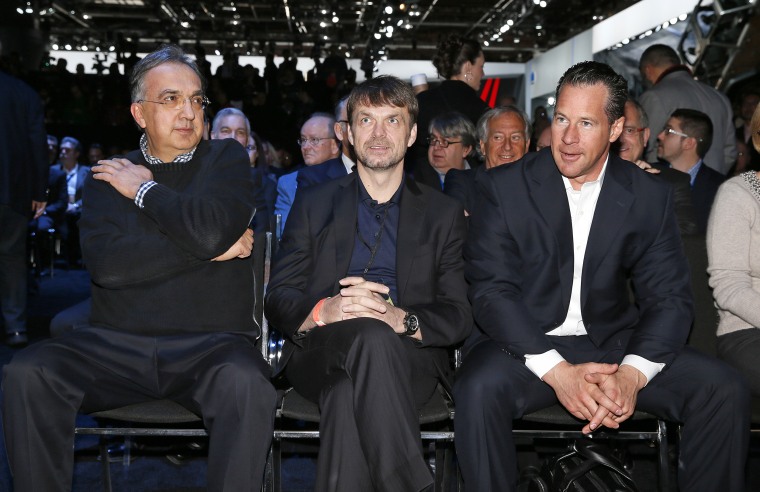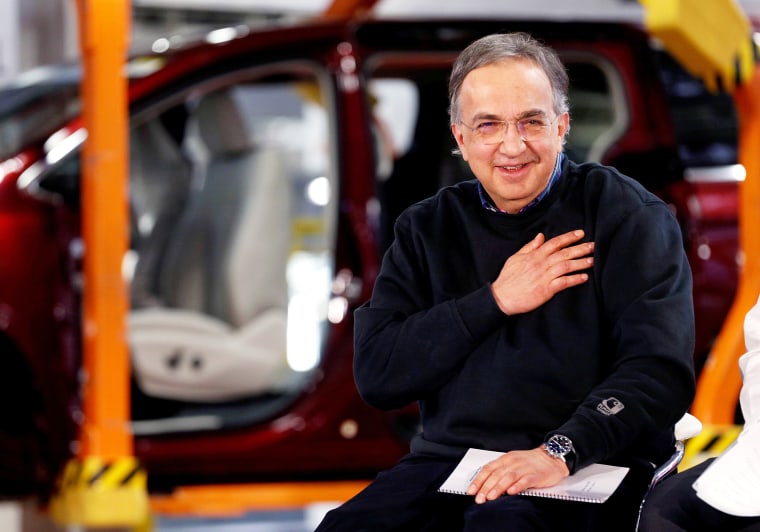Sergio Marchionne, the hard-charging CEO of Fiat Chrysler Automobiles, has unexpectedly stepped down, nearly a year before he was originally scheduled to retire. Michael Manley, the head of the Jeep brand, will take his place.
Fiat Chrysler Automobiles (FCA) issued a statement Saturday reporting that “unexpected complications” following scheduled shoulder surgery had “worsened significantly,” making it impossible for Marchionne, 66, to return to work.
Almost as soon as the statement was released, however, industry insiders began questioning whether there might be another reason for the early retirement.
Born in Italy and raised in Canada, Marchionne developed a reputation as a financial wiz before being named chief executive of Italy’s Fiat in 2004. Five years later, as the Great Recession hammered the global auto industry and forced two of Detroit’s Big Three auto companies into bankruptcy, he made a bold move, agreeing to merge with Chrysler if it received a multi-billion-dollar bailout from the U.S. government.

“His legacy is having combined the two companies to create a relatively solid, relatively strong global manufacturer,” said analyst Joe Phillippi of AutoTrends Consulting. “He turned the Jeep and Ram brands loose and dramatically amplified what they could do.”
Since the two sides of FCA came together, Jeep has shifted from a largely American-based brand into a global powerhouse, with sales roughly tripling to around 2 million SUVs a year. Ram, while remaining more U.S.-centric, nonetheless has challenged bigger brands like Ford and Chevrolet and now generates the bulk of Fiat Chrysler’s global revenue.
Observers pointed to an array of accomplishments credited to Marchionne. One such achievement he is notably proud of is having eliminated FCA’s industrial debt, something he formally announced during an early-June conference in Milan attended by hundreds of industry analysts and journalists from around the world.
The event focused on the car maker’s next five-year plan and opened with data underscoring the dramatic gains made by the Ram and Jeep brands. But the session also highlighted some of the challenges that Marchionne will now leave for his successor — including boosting two Italian brands, Alfa Romeo and Maserati, that are intended to also anchor FCA’s future sales and profits.
“On the negative side, he burned a lot of cash trying to revive Alfa Romeo and it’s still a work in progress,” said Phillippi.
Maserati, the more luxurious of the two brands, has been gaining traction, especially since it launched its first SUV. Meanwhile, Alfa has struggled, with sales currently lagging well behind what was outlined in Marchionne’s previous five-year plan.
“The original five-year plan wasn’t wrong,” Alfa and Maserati brand chief Tim Kuniskis said during an interview with NBC News last month. “We said we’d sell 400,000 [Alfas a year] and we will. It’s just taking longer to get there.” He said that's in part because Alfa has shifted product plans to emphasize SUVs, rather than sedans, reflecting global market trends.
Ironically, under the strategy outlined by Marchionne, FCA’s two marquee brands will be sharply deemphasized. The now-retired CEO insisted though that, while the Fiat and Chrysler brands will shrink in importance, they will remain part of the corporate portfolio, as will Dodge, which will put even more emphasis on building American-style muscle cars.
Reaction to the Milan event was mixed and not nearly as positive as Marchionne and his management team had hoped, according to David Cole, director-emeritus of the Center for Automotive Research. That quickly set the industry rumor mill into overtime. Some claimed that Marchionne might have run afoul of the Agnelli family that founded Fiat and still holds a controlling stake in FCA, with heir John Elkann serving as Fiat Chrysler chairman.
“It might be the Agnelli family,” said Cole. “That’s possible whenever you have such a powerful family controlling a company." But the industry veteran said it is more likely that what was originally described as shoulder surgery is, indeed, the reason for Marchionne’s sudden departure.
As for his successor, the British-born Manley is similar to the constantly moving, no-nonsense Marchionne. He joined DaimlerChrysler U.K. in 2008 and survived the series of setbacks that followed the break-up of that “merger-of-equals.” He took over Jeep in 2009 and more recently added Ram to his purview.
Few, if anyone in automotive circles will be surprised by his appointment, which will become formal when the FCA board meets this week.
The 54-year-old executive was active in developing the five-year plan announced in Milan, but he could yet decide to tweak FCA’s strategy when he moves into Marchionne’s office — or offices, as the former CEO constantly shuttled between Chrysler’s administrative center in the Detroit suburbs, the old Fiat operations in Italy, and FCA’s legal headquarters in London.
One question Manley may soon be pressed to address is whether he will continue his predecessor’s hunt for an alliance or merger partner, or perhaps even try to sell off some or all of FCA. Marchionne felt that was necessary to deliver the scale the industry demands. But analysts also feel it might be critical in order for FCA to catch up to bigger rivals like General Motors, Volkswagen, and Toyota when it comes to key industry trends like autonomous driving and electrified powertrains — areas where it lags well behind.
“Mike is going to have to make a deep dive,” said Phillippi, to see whether he needs to rewrite the FCA five-year plan that Marchionne left him.


